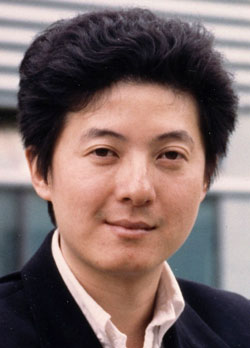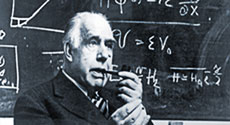Niels Bohr Lecture by Soucheng Zhang
Title: Topological insulators and topological superconductors

Soucheng Zhang, Professor of Physics
Abstract: Recently, a new class of topological states has been theoretically
predicted and experimentally observed. The topological insulators have an insulating gap in the bulk, but have topologically protected
edge or surface states due to the time reversal symmetry. Similarly, topological superconductors or superfluids have novel edge or surface states consisting of Majorana fermions. In this talk, I shall review the recent theoretical and experimental progress in the field, and focus on a number of outstanding issues, including the quantized anomalous Hall effect, quantized magneto-electric effect, the topological Mott insulators and the search for topological superconductors.
About Professor Soucheng Zhang
Prof. Shoucheng Zhang is an internationally recognized leader in the field of condensed matter physics, and has made major contributions to the quantum Hall effect, high temperature superconductivity and quantum magnetism. More recently, his theory work opened up a new field called topological insulators and superconductors. The novel properties of these materials could also open new applications in electronics, and extend the life of Moore's law.Prof. Zhang's theoretical prediction of the topological insulator state has been experimentally confirmed by colleagues at the University of Würzburg, a seminal discovery which earned Prof. Zhang and the Würzburg group the prestigious Europhysics Prize in 2010.
Prof. Zhang received his B.Sc. in physics (1983) from the Free University of Berlin in Germany and his Ph.D. degree in physics (1987) from the State University of New York at Stony Brook. He subsequently held a postdoctoral fellowship at the Institute for Theoretical Physics at Santa Barbara (1987-1989) and a staff position at IBM Almaden Research Center (1989-1993).
Since 1993 he has been a Professor of Physics at Stanford University. He also holds an appointment in the Applied Physics and Electrical Engineering Departments and is currently the co-director of the Stanford Center for Spintronics Science and Application. His research interests lie in the areas of quantum spin transport, the quantum spin Hall effect and the theory of high-temperature superconductivity.
Related literature:
- A. Bernevig, T. Hughes and S. C. Zhang, Science, 314, 1757, (2006)
- M. Koenig et al, Science 318, 766, (2007)
- Xiao-Liang Qi, Taylor Hughes and Shou-Cheng Zhang, Phys. Rev B. 78, 195424 (2008)
- Haijun Zhang, Chao-Xing Liu, Xiao-Liang Qi, Xi Dai, Zhong Fang, and Shou-Cheng Zhang, Nature Physics 5, 438 (2009).
- Xiao-Liang Qi, Run-Dong Li, Jiadong Zang and Shou-Cheng Zhang, Science 323, 1184 (2009).
- Xiao-Liang Qi, Taylor L. Hughes, Srinivas Raghu and Shou-Cheng Zhang, Phys. Rev. Lett. 102, 187001 (2009)
|

 Niels Bohr Lectures
Niels Bohr Lectures